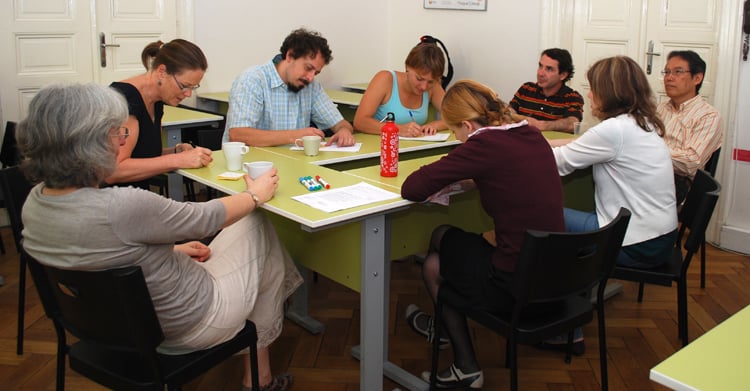Introducing the Advisory Board
by Alex Went, on 07 April 2014 14:55:08 CEST

The purpose of the Advisory Board is to advise on the academic and institutional strategy that underpins plans for college development.The board is one of a number of initiatives being introduced in 2014, the tenth anniversary year of Prague College. Other initiatives include the recent introduction of our Industry Network and an upcoming special conference on strategy, finance, ethics and CSR in June.
Douglas Hajek, the Director of Prague College says, “We are very pleased with the incredible breadth and expertise of our Advisory Board members. Prague College has emerged as a strong institution in central Europe, and we look forward to a future of continued development as we build on this solid foundation. An outstanding board of advisors, like the one we have put together and has agreed to work with us, is a key element in the future development of our institution.”
The annual meeting of the Advisory Board will take place the week of 15 September just before the start of the new academic year.
The first board is an outstanding mixture of accomplished individuals from around the world, including British, Czech, Japanese, American and Italian members.
Board members
- Professor Ronald Barnett is Emeritus Professor of Higher Education at the Institute of Education, University of London where he was both Dean of Professional Development and Pro-Director for Longer Term Strategy. In his academic work, he has been trying to advance a social philosophy of the university, in which he has been attempting to identify creative concepts and practical principles that offer ways of enhancing universities and higher education.
- Bruce Sterling is a legendary American science fiction author, best known for his novels which helped define the cyberpunk genre. His non-fiction works include The Hacker Crackdown, Law and Disorder on the Electronic Frontier (1992), Tomorrow Now: Envisioning the next fifty years (2003) and Shaping Things (2005). He was the "Visionary in Residence" at Art Center College of Design in Pasadena. He was also the Guest Curator for the Share Festival of Digital Art and Culture in Torino, Italy, and the Visionary in Residence at the Sandberg Institute in Amsterdam.
- Dr Liz Marr is Director of the Centre for Inclusion and Collaborative Partnerships at Open University, UK, and has overall responsibility for the strategic direction and smooth running of the Centre which manages the University’s validation partnerships and oversees the development and delivery of access curriculum. She is Managing Editor of the international journal: Widening Participation and Lifelong Learning and a member of the editorial board for Learning and Teaching in the International Social Sciences.
- Rachel Forsyth is Principal Lecturer in Curriculum Development and Innovation at Manchester Metropolitan University, UK, and co-author of ‘Identity Crisis: Working in HE in the 21st Century’. She is particularly interested in quality assurance, curriculum management and assessment in higher education.
- Helena Sebkova is the Director of the Centre for Higher Education Studies, a Czech public research institute. She was the national coordinator for the OECD Thematic Review of Tertiary Education for the Czech Republic in 2004-2008 and recently the coordinator for an international project on European standards for quality assurance at the institutional level.
- Radomir Spok is the executive director of Europeum Institute for European Policy responsible for the think-tank’s financial management. Apart from this position he is working as an independent evaluator of both projects and programmes with a focus on non-governmental organizations. He is a member of Committee for EU which is a body of The Government Council for Non-Governmental Non-Profit Organisations and the Executive Director of the United World Colleges Czech National Committee.
- Minoru Kasuya joined the Japanese project to establish International Pacific College (IPC) in New Zealand in 1987, creating one of the first private institutions with degree granting authority in New Zealand. He served as Chief Executive of IPC for twenty years from 1998-2008 and was awarded Member of New Zealand Order of Merit for his services to education.
- Professor Piercarlo Grimaldi is the founding Dean (Rector), President of the Faculty Council (Academic Senate) and full professor at the University of Gastronomic Sciences in Italy. Like Prague College, this university started about a decade ago and is focussed on innovative approaches to experiential learning. Professor Grimaldi teaches cultural anthropology and he is one of the key people involved in introducing the “slow food” movement to Italy and the world.
Prague College offers university programmes in cooperation with Teesside University from the UK. It has three schools (faculties) in Business Management, Computing and Art & Design. It also has established a research centre whose conferences and publications have achieved international recognition.










